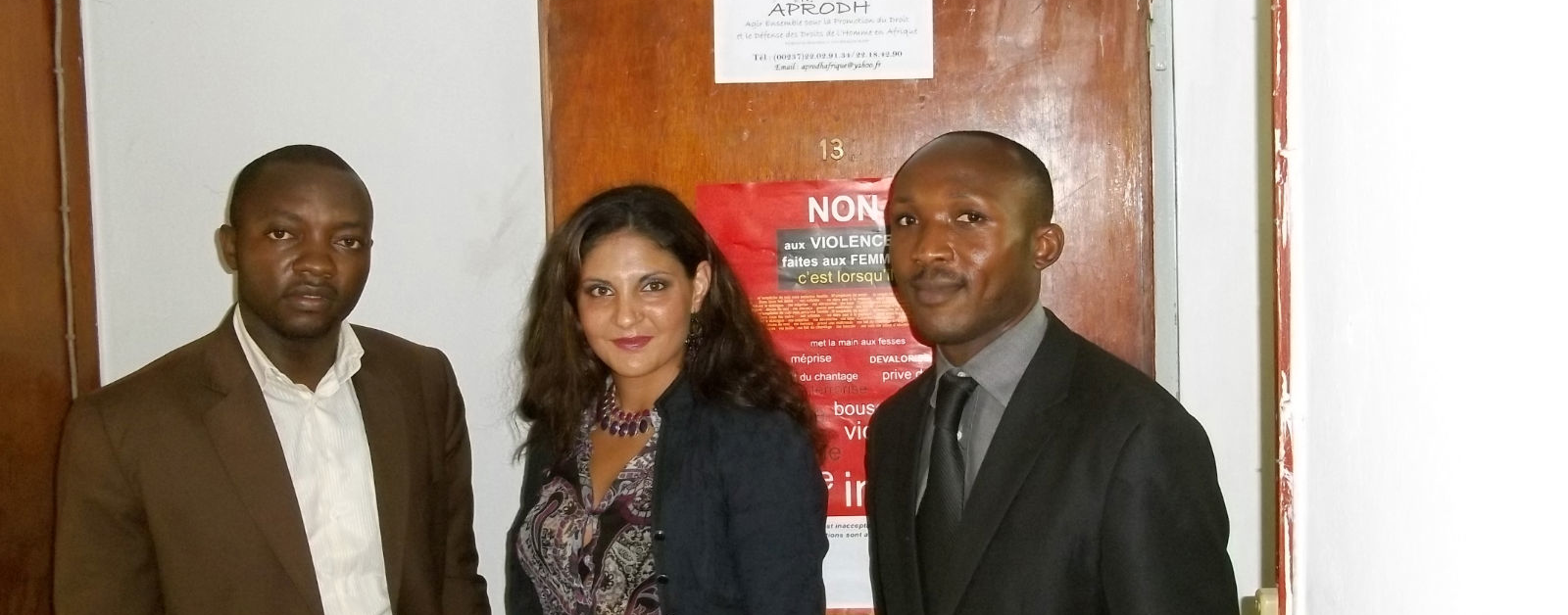
By Krishna Gagné:
In May 2011, I had the occasion to meet personally with Mr Gautier Zomissi in Yaounde, along with his partner, Ghislain Tchakounté, both members of the Cameroon Bar Association. I visited their office and then we moved on to the building where the project is being carried out.
Krishna Gagné (KG) : Mr Zomissi, how did you get involved with the rights of prisoners?
Gautier Zomissi (GZ): I was initially involved in the prison environment through an E.U. financed project named PACDET. I accepted legal aid files for indigent clients and I was deeply moved by the injustices that I witnessed therefrom. The conditions in which detainees live are often inhumane: jails are overpopulated, and prisoners have no access to information about their file. Through my work with PACDET, I had the occasion to better understand the reality of prisoners in Cameroon, which led me to this project. Because prisoners are often forgotten in jail and have no interlocutor to speak to in order to inquire about the status of their file, the need for a green line became obvious. I felt that ought to use my skills to the benefit of the civil society. Our objective is to provide detainees with a free line and give them the possibility to follow up on their file at any time, and even inform us about the existence of a new witness which could exculpate the detainee. We aim to eliminate obstacles to the procedure.
KG: What kind of human right violations are you referring to?
GZ: Well, behind the judicial procedure, there is also a heavy administrative procedure. For example, any party may appeal a conviction. Yet, between the time the appeal is filed and the time it is set down for hearing, it may take two years. The appellant is thus incarcerated during the whole administrative procedure. If the hearing date falls on a public holiday day (which may be decreed the night before in Cameroon), the lawyer must set another date for hearing. In practice, several detainees are forgotten in jail because of long administrative procedures. If no one does diligence, which includes going to the court registry and inquire about the status of a detainee, complying with the administrative procedures, paying the discretionary fees, then the detainee will remain incarcerated. Corruption plays a major role in the delays and a judge may as well be the cause of the delays incurred. In jail, there are also children. Often, they come from poor families who have no means to defend them. This situation is inadmissible. Jails are also filled with acquitted people whose file has been lost in the system.
Can you give me a brief description of your activities from March-May?
We drafted correspondences in order to obtain the required authorizations to access the jail. So far, the Human Rights and Freedom Commission has shown an interest in our project. We are now looking forward to having an access card to visit the Central Jail of Yaounde. Such authorization is long to obtain and we are making regular follow ups. We recruited volunteers and trained them. We contacted the telecommunications companies in Cameroon in order to (a) inquire about the cost of having a green line, and (b) ask for sponsorship for the said line. We also found a suitable office to carry out the project and bought the required working material. Over the past three weeks, we have faced a slow down in our activities due to the fact that we are waiting for answers from all our different interlocutors. We are seeking an administrative authorization from the Justice Department in order to access the jails. Once we have such authorization, we can start our inquiries. It has been now two months since we sent them the administrative file but no action has been taken yet.
KG: Are you on schedule with your project implementation? Have you been able to select cases for legal counseling? Have you started the training sessions as planned?
GZ: We are slightly behind schedule due to the fact that we have not been able to access the jail yet. We are waiting for the authorization from the Justice Department. Once we have the required authorization, we will be able to effectively start the project. Training sessions are completed. Our staff is now ready to start work.
KG: What are your plans for the next couple of months? How are the preparations for upcoming activities coming along?
GZ: As mentioned, once we have the authorization we will be able to visit the jail, meet the detainees and assess their case. We believe that it will take about two weeks to meet the detainees and then we will be in a position to start the diligences before the different interlocutors. Once we get results, we will be in a position to contact other interlocutors and ask for further financial assistance.
KG: Have you encountered any setbacks? Is there anything that you did not expect, that did not go according to plan? How did you deal with these possible setbacks? Do they influence your future implementation plans?
GZ: Yes. Administrative delays are longer than expected. Although the project is received with enthusiasm, it takes substantial amount of time to follow up with our different partners. Once we hear from the Justice Department and the telecom companies, we will be able to move forward on our own. Such delays do not really influence our future implementation plan because once we have the required authorizations, we will be independent.
